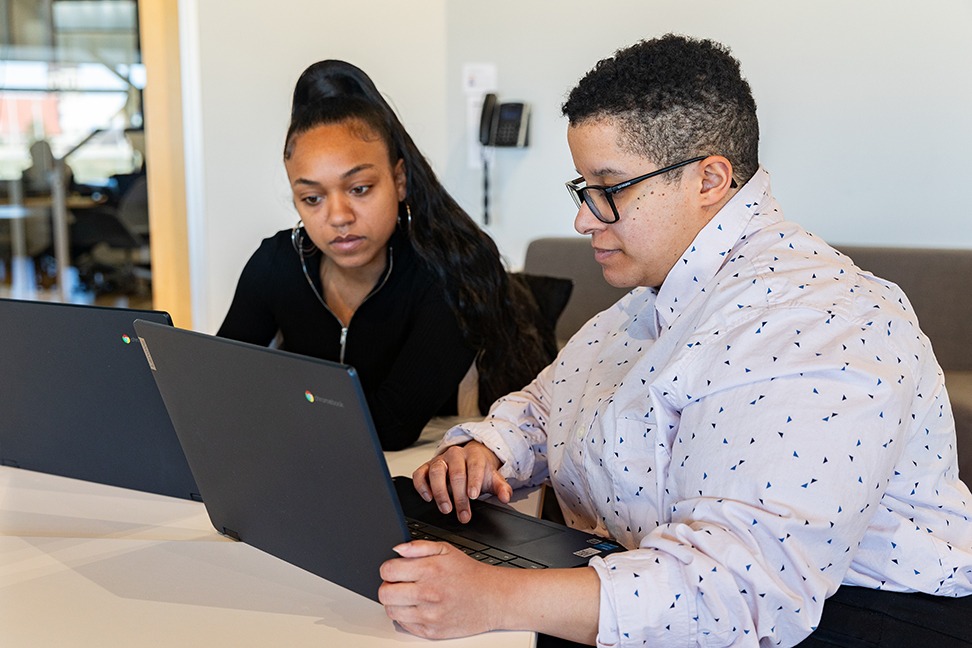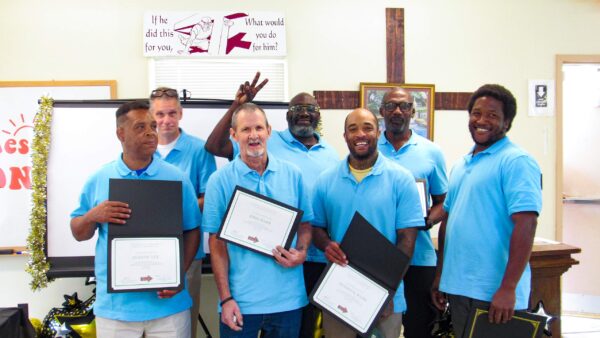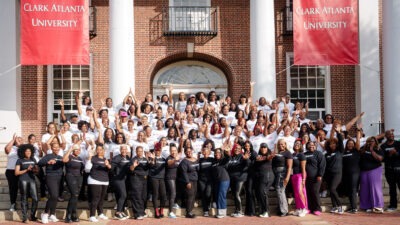This post is also available in: Español (Spanish) Kreyòl (Haitian Creole)
In the early months of the pandemic, Stacia Mason began working at an Amazon warehouse in the West Michigan area. The work was physically demanding, but she consistently demonstrated her ability to handle additional responsibilities.
Over the next year, Stacia received three well-deserved promotions. However, despite her enthusiasm for the work, she found that the pay wasn’t sufficient to meet her needs.
“I had to make the difficult decision to leave my position due to childcare issues. Finding suitable childcare immediately after the onset of COVID was challenging, and it put us in a tight spot,” she explained.
Following her time at Amazon, Stacia took a break to focus on caring for herself and her babies.
Eventually, she secured a position as the manager of a custodial company, earning $25 per hour. During this period, she continued to explore other career opportunities, particularly in the tech industry, although she believed she lacked the qualifications for such roles since she doesn’t have a college degree.
“One day, while I was at home, I received a pamphlet in the mail from the West Michigan Center for Arts and Technology (WMCAT). In the pamphlet, they announced the launch of the first cohort (to be trained) in governance, risk and compliance in cybersecurity,” she recalled. “It felt like divine timing.”
A few days later, Stacia eagerly applied for the program and soon learned she had secured her spot.
Stacia became part of WMCAT’s first tuition-free cybersecurity training cohort in governance, risk and compliance, as part of the organization’s Adult Career Training Program. The seven-month program offered her the ability to learn from home while receiving a small stipend to help with any financial emergencies that might arise.


Jamon Alexander is the president and CEO at WMCAT. He helped launch the program last October.
“Our goal is to address the income and wealth gaps in our communities, and technology provides the opportunity to earn thriving wages,” he said.
Recent data from the Institute for Women’s Policy Research (IWPR) shows that Black women in Michigan working full-time make nearly 65% less money per year than their white male counterparts. In other words, white men in the state make more than $21,000 more per year working full-time than Black women.
Intentionally, Jamon says the program aims to engage people who identify as Black, Indigenous or people of color.
“We know that members of the BIPOC community and women have been underrepresented in technology careers. So for us, it's been important that we target BIPOC communities and women to have access to the opportunities that will drive us into the future.”
Jamon Alexander, President and CEO at WMCAT
This last cohort enrolled 12 people and graduated 11. More than half of them identify as Black, 18% as Latinx or Hispanic, 18% as Asian Pacific Islander, and 9% as multiracial. Nearly 64% of the graduates identified as men, and 36% as women.
In order to guarantee the success of these students, Jamon recognized the importance of delivering tailored and adaptable support to each member within the cohort.
This comprehensive approach involved providing a dedicated one-on-one therapist who remained available to the students throughout the seven-month program, offering essential assistance in their mental health journey.
Additionally, students were granted access to a state benefits navigator who facilitated the application process when needed for state-funded benefits such as Supplemental Nutrition Assistance Program (SNAP) or Medicaid.
It was that “people-first” approach that motivated Tracie Coffman at the W.K. Kellogg Foundation to partner with WMCAT in the work.
“I am always trying to think of the spaces that have career pathways for a lot of growth and great pay but are currently predominantly white,” she said. “Tech is one of those fields.”
According to the State of the Workforce report from CompTIA, an Illinois-based nonprofit Computing Technology Industry Association, more than 200,000 people in the state of Michigan are working in technology. However, only 27% of them are women, and less than 10% identify as Black, with only 3% identifying as Hispanic or Latino.
“WMCAT was very interested in changing that and really targeting people of color for these classes in these pathways through this training,” Tracie explained. “Which directly aligned with one of the areas that we were hoping to focus on here in Grand Rapids.”

Starting wages for a cybersecurity position working in governance, risk and compliance start anywhere from $60,000 to $70,000 per year.
“The tech field has a lot of racial inequities because of who has access to career pathways in the industry,” she said. “But in addition to that, these pathways aren’t just living wages…they are thriving wages.”
It was a no-brainer for her to support a program that can help a family go from living paycheck to paycheck to receiving livable wages.
“It was very exciting to invest in work that was really going to intentionally help families of color seek wages that would help them and the children in those households thrive,” Tracie explained.
When remembering back to the seven months spent learning in the program, Stacia can’t help but say, “It was absolutely amazing.”
“There were a lot of moving pieces still since we were the first class, but as far as the team that we had and the mentors — it was awesome,” she said. “We got to learn who we were as people and how to put those strengths to work for us in the business field and in the corporate world.”
The program provides a blend of in-person and virtual classes to cater to individuals’ diverse work schedules.
“We even had the opportunity to utilize virtual reality for some of our hands-on learning, all from the convenience of our homes,” Stacia mentioned.
Following numerous late nights dedicated to studying and learning, in late June, Stacia took the lead in guiding her graduating class into the next phase of their journey by delivering a speech at graduation.
“Now that I’ve completed the program, I can’t help but feel an overwhelming sense of pride, excitement, and accomplishment. I’m grateful for the fortunate chain of events that led me here, proving that you don’t need a college degree to succeed in tech.”
Stacia Mason
After that memorable night, Stacia received numerous job offers from recruiters who were eager to hire her.
“Being invited to apply for these positions was something I could have never imagined in my wildest dreams,” she remarked.
Today, Stacia works full-time as a governance, risk and compliance analyst at Acrisure, an insurance brokerage company in the area. She works from home, which allows her some flexibility to care for her 2-year-old son. She went from making $25 per hour prior to the WMCAT program, to $70,000 per year.
“I could have never imagined myself not graduating from college and still being able to achieve what I’m earning,” she added. “
The earning potential for someone like Stacia could be upwards of $120,000 dollars per year.
For Stacia, it’s not just the stable and thriving income that has helped her achieve more independence, confidence and security, but also how much she genuinely enjoys doing this type of work.
“It’s the best job I’ve ever had. My team is absolutely amazing. They are so helpful and so kind. And they help me in the learning process, and they are so gracious,” she said.
Today, Stacia feels more confident than ever before about what she’s shown herself she can accomplish.
“The mentors and teachers in the program truly filled my cup to the brim,” she expressed. “They encouraged me, emphasized my strengths and motivated me to keep pushing forward. They also equipped me with the essential tools I’ll need to venture into the tech world,” she added.
In the coming year, WMCAT will add training in cloud security engineering to its existing governance, risk, and compliance training as part of the tuition-free cybersecurity pathwayThese initiatives will provide thirty individuals residing in Kent County with the chance to access high-paying employment opportunities and thrive.


All photos by Isabel Lopez Slattery.







Comments